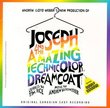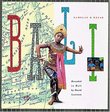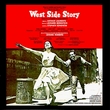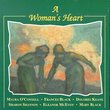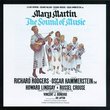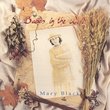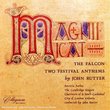| All Artists: Michael Flanders, Donald Swann Title: Complete Flanders & Swann Members Wishing: 3 Total Copies: 0 Label: Emd Int'l Release Date: 4/30/1997 Album Type: Box set, Import Genres: International Music, Special Interest, Pop, Rock, Classical Styles: Latin Music, Tango, Comedy & Spoken Word, Vocal Pop, Forms & Genres, Concertos, Serenades & Divertimentos, Historical Periods, Classical (c.1770-1830), Instruments, Brass Number of Discs: 3 SwapaCD Credits: 3 Other Editions: Complete Flanders & Swann UPCs: 077779746422, 0724352859658, 077779746453 |
Search - Michael Flanders, Donald Swann :: Complete Flanders & Swann
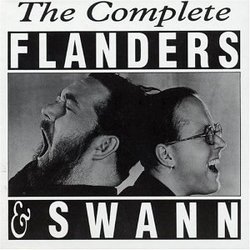 | Michael Flanders, Donald Swann Complete Flanders & Swann Genres: International Music, Special Interest, Pop, Rock, Classical
Fantastic Triple CD Box Set of the Recorded Works of One of Britain's Most Popular Comedy Duos. Their Keen Observations of Everyday British Life and Abilities to Exemplify them in Song Made them the Darlings of the UK. Cle... more » |
Larger Image |
CD DetailsSynopsis
Album Details Fantastic Triple CD Box Set of the Recorded Works of One of Britain's Most Popular Comedy Duos. Their Keen Observations of Everyday British Life and Abilities to Exemplify them in Song Made them the Darlings of the UK. Cleverness, Wit and Absoute Hilarity were the Order of the Day, in Just About Any Style of Music. Pure Comic Genius on Three Discs! Similar CDsSimilarly Requested CDs
|
CD ReviewsIf you haven't heard this... 3rdeadly3rd | Brisbane, Queensland Australia | 01/16/2003 (5 out of 5 stars) "The great comedic pairing of the late Michael Flanders (vocals) and Donald Swann (piano and occasional vocals) must surely rank among the hall of fame of comic singers and songwriters. Descended from the British music hall tradition, these two men wrote and performed music which still sparkles with wit today, some 40 or more years since it was recorded.After being told to take up singing as a means of strengthening his polio-weakened lungs, the wheelchair-bound Flanders teamed up with pianist Swann and proceeded to write such classic songs as "The Hippo Song (Mud Mud Glorious Mud)", "The Gasman Cometh", "The Gnu Song", "A Transport of Delight" and many others. As well as a gently satirical spirit, all these songs feature the sublime wordplay and interplay of both men.The first two discs of this box set are actual concerts - "At The Drop Of A Hat" and its successor "At The Drop Of Another Hat". Recorded at the height of the duo's popularity and form, the sound quality is surprisingly good for recordings this old."At The Drop Of A Hat" opens with three of the Flanders and Swann classics. "Transport Of Delight", a song in praise of the "97 horsepower omnibus" features the wonderful harmonies of the duo on lines like "any more fares" and Flanders' dead-on impression of a London busdriver "Geddardait, we're full right up inside". "Song of Reproduction" deals with the new, as it was then, stereo technology and features Flanders delivering an incredible monologue using every conceivable piece of audiophile jargon. "The Gnu Song" (in which "gnu" is pronounced phonetically) is a real treat. The audience's reaction to the reappearance of the gnu is superb. As well as this opening trio, the disc features Flanders' snippets of "Songs For Our Time" (in which he experiments with conventions of hit songs), "Song of the Weather" (a rundown of English weather throughout the year), "The Reluctant Cannibal" (featuring Swann in the tititular role and the chorus "I can't eat people/I won't eat people/eatin' people is wrong"), Swann's foray into Greek folksong "Kokraki" and the justifiably famous "Madeira M'Dear". The performance ends with a rousing version of "The Hippo Song". Flanders is in fine voice throughout and his comments introducing each song are delivered with deadpan accuracy. The story behind "The Gnu Song" is an absolute masterpiece. Flanders' monologue about the creation of "Greensleeves" is also superb - "'Greenfleeves'. That's an interesting name for a fong" (referencing old English script) being just a taste."Another Hat" begins in equally fine form with "Gasman Cometh" and "Ill Wind". "Gasman", presaged as "a tale of unending domestic upheaval", is sure to have most people who've ever dealt with unreliable tradesmen nodding in agreement, while "Ill Wind" is Flanders' attempt at setting words to a French horn concerto featuring the immortal lines "I lost that horn/lost that horn/lost that horn/found that horn/gorn". The performance continues with Swann's Russian/English song "In The Desert", the ending of which is truly side-splitting. "All Gall" (a reinterpretation of "This Old Man" to fit then-French President Charles de Gaulle) is a little dated but very cleverly done. "Song of Patriotic Prejudice", with its introduction and opening lines grabbing the audience's attention is another triumph, while the "Hippo Encore" is a great end to the performance. Again Flanders is at his peak. His loving description of the Spanish olive-stuffers ("Olividados") and his superb story about flying ("By Air") are both brilliant examples of the shaggy dog story. My favourite from both of these discs would have to be "First and Second Law". Flanders decides to educate Swann in elementary science and picks on the first and second laws of thermodynamics ("heat is work and work is heat" and "heat cannot of itself pass from one body to a hotter body") and the repetition of these phrases in time to Swann's barely-there piano accompaniment is one of the finest moments in British comedy.The third disc is largely forgettable. It begins with a series of animal-related songs performed in a studio and without much of Flanders' rambling introductions. "Warthog" has its moments, while the others were clearly not performed in front of an audience for a reason. "Wompom" is also mildly diverting, presenting a story about a made-up substance which is the answer to everything. The rest of the disc is then filled out with much earlier material in a rather poorly-recorded concert. "20 Tons of TNT" (related to the calculation the pair had done which gave that as the amount of TNT per person on the planet at the time) provides food for thought, but little more.Is this box set for everyone? No. Much of the humour both within and without the songs does require a bit of background knowledge to what was going on in Britain and Europe at the time (1960s), John Profumo is referenced a few times as well as Charles de Gaulle and the Common Market, while a smattering of classical music knowledge can help out a bit with Swann's work and "Ill Wind". The fact that my grandfather (who's in his late 70s) recalls hearing these songs and laughing may give an indication as to the age of some of the subject matter. Equally the fact that "First and Second Law" references an awful lot of physics might do the same.Nevertheless, for anyone who loves British humour done in a gentle manner or who is interested in the source of "mud mud glorious mud/nothing quite like it for cooling the blood", give these CDs some serious consideration." Gentle Satire BDormuth | Lafayette Hill, Pa United States | 04/02/2002 (5 out of 5 stars) "I've been singing Flanders and Swann every day In the Bath since I first heard them in 1964. If you don't know them, think Gilbert and Sullivan by way of English music hall and Noel Coward, with a bit of Tom Lehrer musical satire and classic Bob Newhart or Charlie Manna monologues. F&S commented gently on their times: "The purpose of satire, it has been rightly said, is to strip away the veneer of comfortable illusion and cozy half-truth. And our job, as I see it, is to put it back again." Quite simply the best comic songs and patter of the 20th century. Michael died in 1975, Donald in 1994. Goodnight, Mabel Figworthy, wherever you are.Here are some samples of Michael's verbal wit.Wordplay: - "A Transport of Delight," their song of the pleasures of the double-decker bus "has recently been adopted as the theme song of the Underground resistance movement." - Speculating that Henry VIII wrote Greensleeves: "and the royalties go to royalty." - About a tennis referee late in the day: "the umpire upon whom the sun never sets." - Explaining how he was hoisted in his wheelchair onto airliners by a fork lift: "Why they need a great machine like that to lift forks I do not know. Well, they're only plastic, now, aren't they?" - On status symbols: "The object is to Gunga Din your neighbor: 'I'm a better man than you' is the acid test," and, "let's bang our status cymbals with the best." - To a disenchanted cannibal: "You used to be a regular anthropophagi." - Of a lecher: "And he said as he hastened to put out the cat, the wine, his cigar, and the lamps," while the girl "lowered her standards by raising her glass, her courage, her eyes, and his hopes." - At the corrida d'olivas (the Andorran festival of olive stuffing, not to be confused with the Spanish corrida de toros, or bullfight): "And a great cry goes up of Ole! He has made an 'ol." - "It's no good going up to a scientist and saying to him like you would to anybody else, 'Good morning, how are you, lend me a quid, and so on.' He'll just glare at you, or make a rude retort."Throw-aways - During the height of the cold war the Soviet Union sent the Moscow Ballet on a world tour. Donald sang one chorus of the Hippopotamus Song "mud, mud, glorious mud - nothing quite like it for cooling the blood" in Russian. Michael: "That should improve our cultural relations." - During the 1963 Mandy Rice-Davies and Christine Keeler scandal: "None of that going around saying no smoke without fire. Nil cumbustibus, Profumo." Also, from "Friendly Duet," "such models of friendship are precious and rare, while the friendship of models is not." - "Now if you're writing a musical, as I'm sure practically all of you are, . . ." - Of Donald: "You know that no one has a higher regard for your music . . . than you do yourself. I merely meant that you are not great because you are not dead. If you wish to be great you must stop composing and start decomposing." - "We never found a rhyme for (Soviet Premier Nikita) "Kruschev" until he was dead: Did he die or was he "pushed off"?" - "We spent two dreadful, uh, delightful years, entertaining the Americans whose need, let's face it, is greater even than yours. Of course, when we're over there we say that the other way 'round." - "No matter what you may say about the Germans, and who doesn't . . ." - "Some of the songs that have made our names a household word, like slop-bucket . . ." - "They've started testing cars now. They started at 10 years, then 5, now three. There's even some talk of having them tested before they leave the factory."Absurdities - "I'm delirious about our new oven fitted with the eye-level grill. This means that without my having to bend down the hot fat can squirt straight into my eye." - A spectator during the construction of Stonehenge: "So, it's not going to be lived in. Well, that's something anyway. So what is it, then? It's a what?! A calendar?! A bit big for a calendar isn't it? You'd look pretty foolish with that on your desk." - "Donald knocked himself out this morning. Got one of those new pop-up toasters. Nasty things."Incredible multiple rhymes: - "The fair hippoptama he aimed to entice from her seat on her hilltop above, as she hadn't got a ma to give her advice, went tip-toeing down to her love." - Of Josephine: "Nonsense, said Bonaparte. She lives on her own, apart, in her own apartment." - "Oh let us be married if our parents don't mind. We'd be happy and inseparable. Inextricably entwined. We'd live happily every after, said the Honeysuckle to the Bindweed." - "And you'll always see a single lace-less left-hand leather boot. A bootless British river bank's a shock. We leave them there at midnight, you can track a member's route by the alternating print of boot and sock."" The Gilbert and Sullivan of the 20th Century BDormuth | 07/14/2001 (5 out of 5 stars) "Flanders and Swann were the Gilbert and Sullivan of the 20th century. They wrote very funny songs about a whole range of subjects, exposing both the silliness of the little things in life (such as their songs about the weather and gas repairmen) and the silliness of pretentious and bigoted people. All this without any of the easy comic outs of jokes about sex, violence, and politics. The songs range from some that make you giggle or grin to some that have tears of laughter run down your cheeks.Some songs concentrate on the annoying little things in life. My personal favorites are "A Song of the Weather", where every month has a fitting description of its lousy weather ("In July the sun is hot/ is it shining? no it's not") and the constant attempts at dieting in "Food for Thought" ("The people want bread, my lord" - "tell them not to eat cake!"). Others decribe anything from how repairmen tend to make work for each other ("The Gas man Cometh") to the ordeal of the poor tennis judge ("Tried by the Center Court.")Flanders and Swann reach their height, however, in satirizing people's ungrounded feelings of superiority. This includes racists (in "Misalliance", a song about two plants of different species who fall in love - to their parent's disapproval of the "mixed marriage"); my-country-right-or-wrong fanatics ("A Song of Patriotic prejudice"); those who sneer at the "barbaric practices" of "uncivilized" nations (the wonderful "The Reluctant Cannibal"); and warmongers ("20 tons of T.N.T."), among others. But they also make fun of those who have more socially acceptable, but just as silly, feelings of superiority. These inlcudes "audiophiles" who MUST have the latest audio equipment to show they are "real" music lovers ("Song of Reproduction"), the "house-and-garden" crowd that are always out to outdo the neighbors ("Designed for Living"); the cultural "avant guarde" who praise vulgarity and bad taste as "brave and cutting-edge" art ("p**p*b****b**d*****" - listen to it to see what it means...); armchair psychoanalysts ("Twice Shy", which "explains" how insufferably annoying people are "really" shy inside: "He's shy, he's shy - though he wears a flourescent tie..."); and more. If you like comical music at all, do yourself a favor and buy this album."
|

 Track Listings (17) - Disc #1
Track Listings (17) - Disc #1

